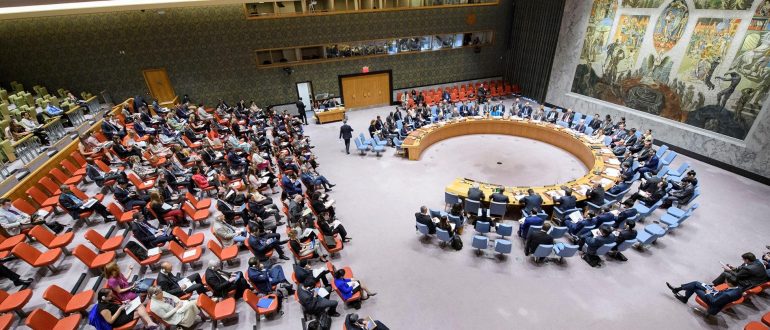
From institutionalised Frameworks to “Coalitions of the Willing” – The Syrian Civil War
In the Syrian Civil War, Russia has become the key actor, while the Syrian opposition is fragmented and Western powers hesitate to intervene. This situation reflects the decreasing influence of traditional Western powers and institutions. International frameworks, like the UN, are not effective anymore due to inherent shortcomings in their institutional set-up. These shortcomings become apparent in the power shift from West to East, as for instance in Syria, and generate a new form of international coordination: the coalitions of the willing. In the Syrian conflict, such coalitions are represented in the Astana peace talks or the international US-led coalition to fight ISIS. This article takes the Syrian Civil War as a case study to better understand these coalitions of the willing by looking at the different actors and their interests.
What Russia, Turkey and Iran want & what the US doesn’t want
When the Arab Spring hit Syria, Russia feared not only to lose an ally with the Assad clan but also that the revolts could eventually arrive at home. Internal stability is the fundamental guideline in Russian politics, and if necessary, achieved by repressive measures (Bino & Kraus 2017: 77). For Russia, democratic uprisings are external dangers deliberately initiated by Western intelligence to destabilise opposing regimes. Therefore, Russian interventions in support of autocratic allies are aimed at shielding Russia against potential spill-overs and in legitimising the Kremlin as the sole defender of Russian security (Adomeit 2017: 37). Besides domestic stability, there certainly are strategic motives: Syria provides the closest access to the Mediterranean. Russia hence intends to become indispensable for a political solution in Syria, so that its interests, like securing its access to the Mediterranean Sea, cannot be ignored.
Iran tries to become part of Russia’s solution, although the two cooperate only as far as it serves their needs. Tehran seeks to establish itself as the regional power in the Middle East, perhaps in preparation for renewed isolation efforts by the US. Its continued support of Hezbollah, a Shia Muslim party represented in Lebanon’s National Assembly, but also a terrorist militia, provides it with a strong local ally against Israel and the US. The Assad regime tolerated this support. To keep Assad in power and hence secure Iranian interests, siding with Russia is a promising option as it also opposes Western interventionism: Moscow’s support of Assad (a Shia Muslim regime) opposes Saudi Arabia (Sunni Muslim regime), a supporter of the anti-Assad factions, traditional US ally and Tehran’s archenemy.
Yet, Russia and Iran are quite isolated in their support of Assad in the region (Geranmayeh & Liik 2017: 85). No other state supports the regime, as most of the Arab states, even Syria itself, are predominantly Sunni Muslim. The Sunni population in and outside of Syria will thus be hesitant to accept a Shia ally as negotiator for a post war Syria. It therefore remains open how long Iran and Russia can cooperate in this matter.
For Turkey, the Syrian situation poses an increasing threat to its national security due to ISIS and the Kurdish held regions in the north, which present liberalisation opportunities for the Turkish Kurds. The Free Syrian Army receives Turkish support to fight ISIS and Assad. In the early phase of the war, Ankara restated its support for a regime change. Whether this is still true today is doubtful, as Ankara conceded that Assad’s removal is unlikely at the moment. But the three million Syrian refugees in southern Turkey impose an increasing financial and humanitarian burden on the state, whose economic growth rates (especially in tourism) decline, while the inflation rate reaches double-digits. Thus, it would also be of economic interest to end the conflict.
The Middle East presents a dilemma for the US. President Bush’s 2003 Iraq war was a turning point in US foreign policy, when it became clear that the intervention had caused more problems than it solved. A fundamental mistake was to underestimate the intervention’s impact on the population and generations to follow. ISIS can be deemed a product of the destroyed Iraqi state institutions, army and Baath party, and the subsequent sectarian politics (cf. Gerges 2016). President Obama gradually withdrew US troops and thus tried to break with this interventionist foreign policy. Most of the Middle East proved to be too complicated to be stabilised by outsiders and the eastern Pacific region is strategically more important now. Once it was clear that the US would not risk another fiasco in Syria, the path to Damascus was free for Moscow. Its indecision made the US appear unreliable and encouraged Assad’s allies, specifically Russia, to create a new power base for them in the Middle East (Bino & Krause 2017: 76). During his election campaign, Donald Trump declared no interest in any enhanced efforts for Syria. As a result, Russian air and intelligence support intensified heavily afterwards and assisted the Syrian Army’s capture of Aleppo, which generated significant territorial shifts and a moral victory for the regime. Although President Trump received widespread acknowledgement and support for the air strike on the Syrian air base, the strike was not coordinated within a greater strategy.
What has not been achieved at Geneva comes along in Astana
The UN started several peace initiatives since the outbreak of the civil war in 2011, most recently the “Geneva Talks”. The outcome of these talks was disappointing: The situation on the ground has not improved and UN cease-fires did not last (cf. also Wintour 2017, The Guardian). In late 2016, a second format of negotiations on the future of Syria was advanced under Russian patronage in the Kazakh capital Astana, officially backed by Security Council resolution 2336 (16). The Astana talks are not only symbolically a setback for the UN efforts, but effectively change the position of the West: Russia and Iran have the upper hand in the negotiations, while Western diplomats are watching rather than negotiating at Astana (Solomon 2017, Financial Times).
Even in Geneva, Assad’s removal is not necessary anymore and the long proposed safe zones were now agreed on in Astana. It shows that the traditional way of coordinating peace talks in order to stabilise certain regions does not work through the institutionalised channels anymore. UN efforts seem rather inefficient. More importantly, the institution, which was initiated to coordinate these very efforts, fails because of its set-up: the permanent members’ vetoes in the security council can lead to a deadlock any time. Although Astana has not come up with a political solution, it has been more successful in brokering cease-fires. What can be observed now are “coalitions of the willing”, not only in Syria, but in many areas, that substitute institutionalised international cooperation.
Coalitions of the Willing
In contrast to institutionalised forms of coordination, coalitions of the willing do not possess one “centre of gravity”. Coalitions of the willing evolve from multiple centres of gravity, which coordinate differently in each case. If there are shared interests or goals after a situational assessment, collective action is possible. If there is disagreement about the situation, no cooperation is mandatory. In in the end, every entity is autonomous in their decision to participate in a coalition, to not act at all, or to act individually.[1]
Interestingly, traditional centres of gravity decrease in influence and coalition building increasingly develops. The UN, as the best example for a centre of gravity, was unable to pass effective resolutions on Syria due to Russian (and Chinese) vetoes, which blocked the Security Council. The Geneva Talks were not advancing, so different centres of gravity eventually coordinated the reaction: Moscow, Tehran and Ankara. Each player follows its own agenda over the long-term, Moscow builds a power base in the region, Tehran supports its Shia allies and Ankara fights ISIS’ and Kurdish’ troops, but all form a coalition in the short-term, exploring strategic synergies.
Similarly, action against ISIS in Syria and Iraq is coordinated multilaterally, not by a single centre of gravity. The US still leads these initiatives, but the bottom line is: coordination, cooperation and coalitions cannot be predicted anymore, as it was possible when the UN or the US (or any other powerful entity) were the sole centres of gravity.
Conclusion
The war of proxies in Syria reveals that the West lost its role as the primary power. Global power relations are changing and forging deep cleavages in the network of institutions, which was set up to facilitate a global order under Western dominance. Time will tell whether coalitions of the willing, new forms of institutionalised coordination or a mixture of both will dominate over the next years. It will be especially interesting to observe how China will behave in the upcoming months, given the presence of reportedly over 1000 Uyghur fighters amongst the jihadist movements in Syria (cf. Lin 2017).
[1] “Coalitions of the willing” in this context have been introduced and explained to me by: Andreas H. Karsten, Senior Advisor, Global Challenges Forum Foundation, Geneva.
References:
Adomeit, Hannes 2017: Innenpolitische Determinanten der Putinschen Außenpolitik, in: SIRIUS – Zeitschrift für Strategische Analysen (1/1), 33-52.
Bino, Tomisha and Joachim Krause 2017: Russia changes the game: Bilanz der russischen Militärintervention in Syrien, in: SIRIUS – Zeitschrift für Strategische Analysen (1/1), 68-79.
Geranmayeh, Ellie and Liik, Kadri 2017: Echte Partner oder arrangierte Ehe? – Russland und der Iran kooperieren so eng wie nie zuvor, in: Internationale Politik (1/2017) 84-97.
Gerges, Fawaz A. 2016: ISIS: A History, Princeton University Press.
Dr. Lin, Christina 2017: For China, Syria is the “New Afghanistan”, in: ISPSW Strategy Series (488/2017).
Solomon, Erika 2017-01-25: West sidelined to the bar in Russia-led Syria talks, in: ft.com (https://www.ft.com/content/1569031e-e2fe-11e6-8405-9e5580d6e5fb).
Wintour, Patrick 2017-08-03: Syrian groups complain that other countries are hijacking UN peace talks, in: theguardian.com (https://www.theguardian.com/world/2017/aug/03/syrian-groups-complain-other-countries-hijacking-un-peace-talks).

